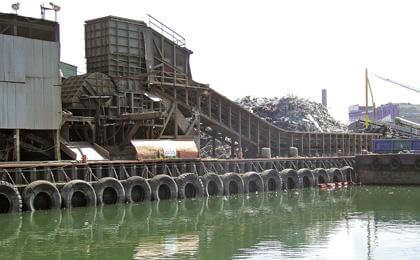By Jeremy Walsh
The city has agreed to go along with environmentalists and federal elected officials, endorsing the designation of Newtown Creek as a federal Superfund site, but officials are worried about the effects the move will have on businesses eking out an existence along the toxic waterway.
“Many of the projects and initiatives underway in and around Newtown Creek are designed to bring long-desired services and amenities to the creek’s waterfront and adjacent neighborhoods and have the strong support of local communities and elected officials,” members of Mayor Michael Bloomberg’s office wrote in a Dec. 23 public comment to the federal Environmental Protection Agency.
With the public comment period closed, the agency will now consider whether to place the site on its priorities list.
With a Superfund designation, federal authorities would be able to conduct clean-up operations first and then bill the entities deemed responsible for the pollution. For Newtown Creek, which has been an industrial hub for more than 150 years, these include oil giants ExxonMobil and British Petroleum as well as Phelps Dodge, a multinational metal company that owns a property along the creek already on the federal clean-up list.
But the Superfund program seldom deals with sites as densely populated as Newtown Creek. More than 300,000 people live within a mile of the waterway, greater than the total sum of the populations of 40 of the other 66 contaminated sediment dredging sites currently managed by the EPA, the mayor’s office noted.
“[The city] has really significant concerns about being able to operate the creek as an active waterway as a Superfund site,” Department of City Planning official Penny Lee told Community Board 2 at a meeting last Thursday.
The city has a $280 million proposed plan for improving water quality in the creek, including a system to cut down on floating pieces of waste from sewer overflows, a Dutch Kills relief sewer and the environmental dredging of nearly 170,000 cubic yards of material in Maspeth Creek.
Still more money is slated for dredging other portions of Newtown Creek as well as the replacement of a sludge barge dock on the Brooklyn side of the creek. The city is worried the Superfund designation would make the city liable for some of the cleanup for potentially dislodging some of the toxins embedded in the silt.
The city also called on the EPA to contact smaller businesses before the cleanup to document whether they are liable or not. Such documentation would help businesses in the area get loans or sell their properties for reasonable prices.
Other players in the lengthy saga to clean up Newtown Creek were more enthusiastic about the possibility of making the National Priorities List.
“EPA is currently the only governmental entity with the resources, technical expertise and legal authority to ensure that a comprehensive remediation of Newtown Creek is accomplished,” Riverkeeper’s Hudson River director, Phillip Musegass, wrote. But he also added that the agency “should make every effort to initiate constructive communication with local business owners who may be affected by a Superfund designation.”
Reach reporter Jeremy Walsh by e-mail at jewalsh@cnglocal.com or by phone at 718-229-0300, Ext. 154.
































